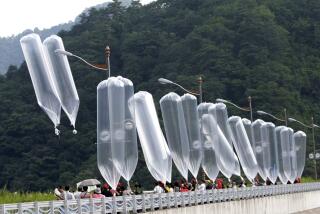Show Us Your Power, Television
- Share via
Maybe only CNN now can save the starving children of North Korea. Indeed, it is getting past prime time for the Western broadcast media to intervene in a calamity in which a whole youthful generation is dying. In a chilling announcement last week, the United Nations Children’s Fund reported that 800,000 North Korean children--close to 40% of all preschoolers--are enduring severe malnutrition and 80,000 of them are near death from starvation. The U.N. World Food Program has appealed urgently for an immediate shipment of a huge amount of grain. The magnitude of the horror requires a worldwide sense of moral crisis.
Only television can now bring that about. While individual photographs of suffering have gotten out of that closed Stalinist country, the kind of continuous visual bombardment that only TV can provide--and that CNN does best--has been notably absent. Consider how many lives were saved by the worldwide broadcasting of live TV pictures of the flight of the Kurds from Iran in 1991, of the starvation of the Somalis in 1992, of the shelling of Sarajevo in 1993, of the slaughter of Rwandans in 1994. What’s needed now is a mass constituency for these young and unknowing victims to foster a global sense of responsibility for their fate. Says Lionel Rosenblatt, president of Refugees International, who has studied past crises: “The CNN factor--heavy media coverage of humanitarian emergencies--can prove a critical influence on policy makers.”
But today, two years past the famine’s inception, no live video showing the widespread horror has been allowed out. The children of North Korea, a land overwhelmed by torrential floods two years ago and now reeling from a brutal summer drought, suffer at the hands of the country’s incompetent government that stubbornly continues to practice its suicidal philosophy of national self-reliance. And so North Korea, with few friends and no real allies, sacrifices its young to a discredited ideology and insane national pride on a scale that is now staggering. Western couch potatoes, whose periodic awakenings to political consciousness can strike fear in the hearts of national governments, simply have not been exposed to scenes of black Korean hair turned orange for lack of protein, children stunted and shrunken by malnutrition, skins sagging off bones, eyes sunken in hopelessness. It’s time that they were.
The world has plenty of food in reserve and much, though far from enough, has been given. But North Korean authorities have made the job difficult. Until recently, they would not permit international observers to make sure that all of the aid went to the hungry, not to the military or the political elite. And South Korea, under constant ideological harangue by the North, has wanted political concessions in return for food aid. The intimate link between aid and concessions, which both the U.S. and South Korea publicly deny, has added to the malnutrition without easing the tension.
In New York City last week, a preliminary session of the long-awaited four-party Korean peace talks (both Koreas, plus the U.S. and China) were off to a fitful start. We can’t count on these talks to save children. Nor on Japan, Asia’s richest nation, which has plentiful grain in storage but has sent relatively little to Pyongyang as aid.
To date, the famed CNN factor has been missing in action. Knowing this--and deeply, professionally and personally unhappy about it--Eason Jordan, CNN’s president of international networks and global news gathering, quietly left for North Korea on Saturday, his seventh trip there in three years, to try once again to persuade officials to let his cameras in. Other quality electronic and print organizations have been trying hard, too, but Jordan is appealing personally to relationships built up over the years with top officials there: “We try and we try and we try but access to North Korea is sharply limited,” he told me, just before leaving CNN headquarters in Atlanta, “I don’t know what I’ll be able to do or see in North Korea this time. I’ve come to learn to expect the unexpected and never have high expectations.” Jordan and others in the Western media know that time is running out for the youngest North Koreans.
Indeed, world disaster expert Andrew Natsios suggests in an essay included in the recent, definitive Brookings Institution book “From Massacres to Genocide: The Media, Public Policy and Humanitarian Crises” that media intervention may have only a tiny window of opportunity to have a significant effect: “There is a certain point in the process of starvation when people are so weakened that interventions are ineffective,” he says.
For all anyone really knows, many North Korean children may be at that point. But surely not all. Heavy will be the burden on the conscience of the Western media if people like Jordan don’t do all they can; and on all the rest of us--especially the West’s well-fed, well-clothed and well-housed--should we fail to give our best effort to ameliorate one of the bleakest humanitarian catastrophes of our time. None of these suffering Korean children came into the world asking to be communists or to live under a regime that would allow them to starve. For them, it seems, CNN and other world media organizations offer the last lifeline before they sink into the black hole of the failed state of North Korea.
More to Read
The biggest entertainment stories
Get our big stories about Hollywood, film, television, music, arts, culture and more right in your inbox as soon as they publish.
You may occasionally receive promotional content from the Los Angeles Times.










